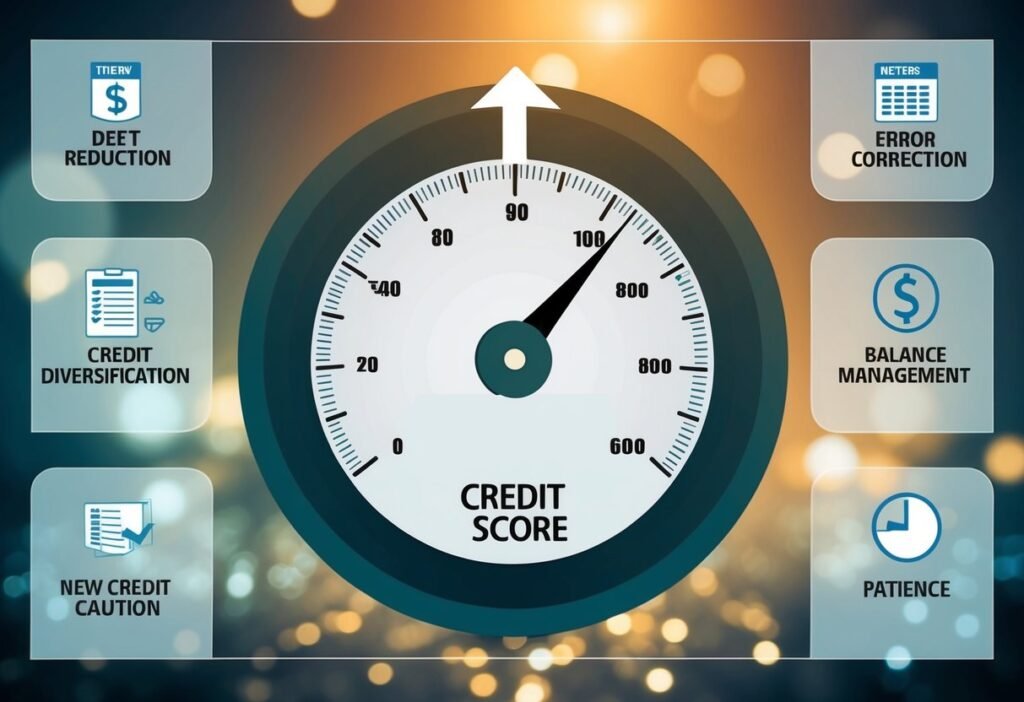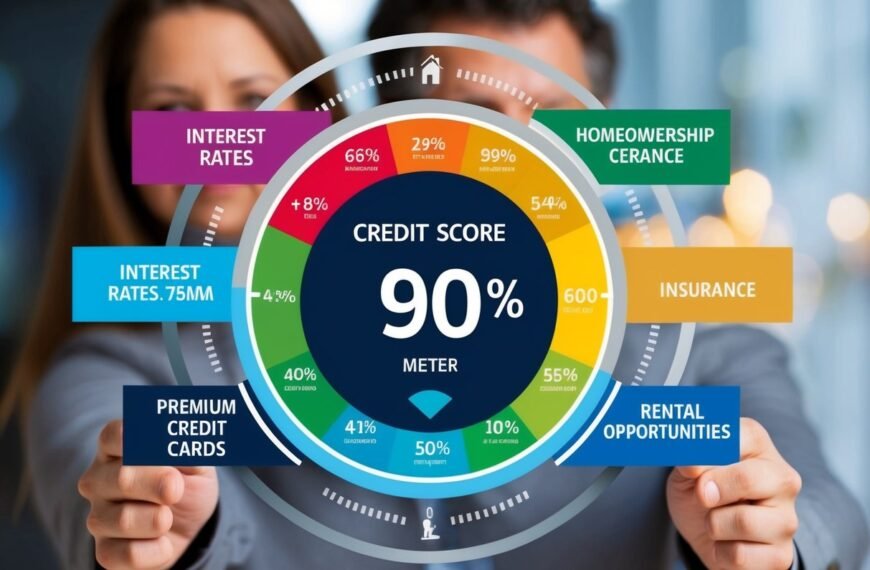
Explore the earlier installment of this series in Part 5-Dealing with Credit Issues and Negative Marks to build a comprehensive understanding before delving into this chapter.
In this chapter, you will discover effective strategies to improve your credit score. From paying down debt to disputing errors and inaccuracies, diversifying credit types, managing credit limits and balances, avoiding new credit pitfalls, and embracing patience and persistence, this article covers a wide range of techniques to empower you in taking control of your credit. By implementing these techniques, you can embark on a journey toward a better credit score and enjoy the long-term benefits that come with it. So, let’s delve into the world of credit score improvement and unlock the possibilities it holds for you.
Paying Down Debt
The Link Between Debt and Credit Scores
Your credit score plays a vital role in your financial life. It can determine whether you can get approved for a loan, secure a favorable interest rate, or even rent an apartment. One major factor that influences your credit score is your debt. The amount of debt you have and how you manage it has a direct impact on your credit score. The higher your debt, the lower your credit score can be. Therefore, if you are looking to improve your credit score, it is essential to focus on paying down your debt.
Strategies for Paying Off High-Interest Debt
When it comes to paying off debt, it’s crucial to have a strategy in place. High-interest debt, such as credit card debt, can be particularly burdensome and can quickly accumulate if not managed properly. One effective strategy for tackling your debt is the snowball method. With this approach, you start by paying off the smallest debt first while making minimum payments on the rest. As you pay off each debt, you gain momentum and motivation to continue paying off the next, creating a snowball effect.
Another strategy to consider is the debt avalanche method. This approach focuses on paying off debts with the highest interest rates first while making minimum payments on the others. By prioritizing high-interest debt, you can save money on interest payments over time. Ultimately, the best strategy for you will depend on your personal financial situation and preferences.
Debt Snowball vs. Debt Avalanche Methods
Both the debt snowball and debt avalanche methods have their advantages and disadvantages. The debt snowball method offers psychological benefits by giving you quick wins as you eliminate smaller debts. This method can provide a sense of accomplishment and motivation to continue paying down your debt. On the other hand, the debt avalanche method prioritizes saving money on interest, which can be financially advantageous in the long run.
Ultimately, the best approach for you will depend on your financial goals and personal preferences. If you prioritize quick wins and motivation, the debt snowball method may be the right choice. If saving money on interest is your primary concern, the debt avalanche method may be more suitable. Regardless of the method you choose, the key is to develop a plan and stick to it.
Disputing Errors and Inaccuracies
The Role of Accurate Credit Reports
Accurate credit reports are vital for maintaining a healthy credit score. Credit reporting agencies gather information about your credit history, including your payment history, credit utilization, and any negative marks such as late payments or collections. This information is used to calculate your credit score. Unfortunately, credit reports can sometimes contain errors or inaccuracies that can negatively impact your credit score. It’s important to regularly review your credit reports to ensure they are accurate.
Identifying and Documenting Errors
When reviewing your credit reports, it’s essential to carefully examine each section to identify any errors or inaccuracies. Common errors include incorrect personal information, accounts that do not belong to you, outdated information, and incorrect payment history. If you come across any errors, it’s crucial to document them by taking screenshots or making notes. This documentation will be helpful when you take the next step to dispute the errors.
The Process of Disputing Errors with Credit Bureaus
To dispute errors on your credit report, you need to contact the credit reporting agencies. You can do this by mail, phone, or online. Provide them with the necessary documentation and clearly explain the errors you identified. The credit reporting agencies are required by law to investigate your dispute within a reasonable period, typically 30 days.
During the investigation, the credit reporting agencies will contact the creditor or lender associated with the disputed information to verify its accuracy. If the information is found to be incorrect, it will be corrected or removed from your credit report. Once the investigation is complete, the credit reporting agencies will provide you with an updated copy of your credit report.
Diversifying Credit Types
The Impact of Different Types of Credit on Scores
Diversifying your credit types can have a positive impact on your credit score. Your credit mix, which refers to the different types of credit you have, accounts for 10% of your FICO credit score. Demonstrating that you can manage various types of credit responsibly shows lenders that you are a reliable borrower. Common types of credit include credit cards, installment loans, and mortgages.
Responsible Use of Credit Cards
Credit cards can be a valuable tool for building credit, but they must be used responsibly. To make the most of your credit cards, ensure that you pay your bills on time, keep your balances low, and avoid maxing out your cards. Additionally, it’s important to avoid opening too many credit card accounts within a short period, as this can negatively impact your credit score.
Considering Installment Loans and Mortgages
Another way to diversify your credit types is through installment loans and mortgages. Installment loans, such as auto loans or personal loans, demonstrate your ability to manage fixed monthly payments over a set period. Paying off these loans responsibly can boost your credit score. Similarly, having a mortgage and making timely payments can have a positive impact on your creditworthiness.
Managing Credit Limits and Balances
Understanding Credit Utilization Ratio
Your credit utilization ratio is the percentage of your available credit that you are currently using. It is calculated by dividing your total credit card balances by your total credit limits. Your credit utilization ratio accounts for 30% of your FICO credit score and is an essential factor lenders consider when assessing your creditworthiness. It’s crucial to keep your credit utilization ratio low to maintain a good credit score.
Maintaining Low Credit Card Balances
To keep your credit utilization ratio low, it’s important to maintain low credit card balances. Try to pay off your credit card balances in full each month to avoid carrying high balances that contribute to a high credit utilization ratio. If it’s not possible to pay off your entire balance, aim to keep your balances as low as possible and avoid using a large percentage of your available credit.
Avoiding the Temptation of Maxing Out Cards
Maxing out your credit cards can have a significant negative impact on your credit score and financial well-being. It increases your credit utilization ratio, which can lower your credit score. Additionally, carrying high balances on your credit cards can result in high-interest payments, making it harder to pay off your debt. It’s essential to only charge what you can afford to pay off and avoid relying too heavily on credit cards.

Avoiding New Credit Pitfalls
The Impact of Multiple Credit Inquiries
Applying for new credit often requires a lender to check your credit history, resulting in a hard inquiry on your credit report. Multiple hard inquiries within a short period can signal to lenders that you are actively seeking credit, which can raise concerns about your financial stability. While a single hard inquiry may have a minimal impact on your credit score, it’s important to be cautious about applying for too much new credit at once.
Responsible Approaches to New Credit Applications
When considering new credit applications, it’s crucial to be responsible and strategic. Only apply for new credit when necessary and research the terms and conditions of different lenders to find the best options for your financial situation. Avoid applying for multiple credit cards within a short period and aim to space out your credit applications to minimize the impact on your credit score.
Co-signing Considerations
Co-signing a loan or credit card for someone else can have an impact on your credit score and financial well-being. When you co-sign, you are equally responsible for the debt, and any missed payments or defaults can negatively affect your credit score. Before agreeing to co-sign, carefully consider the financial responsibility involved and whether you are willing and able to take on the potential risks.
The Role of Patience and Persistence
Setting Realistic Expectations for Credit Improvement
Improving your credit score is a journey that requires patience and persistence. It’s important to set realistic expectations and understand that credit score improvement takes time. It’s unlikely that your credit score will change overnight, but by implementing positive credit habits and staying on track, you can see gradual improvements over time.
Celebrating Small Wins Along the Way
As you work towards improving your credit score, it’s essential to celebrate the small wins along the way. Paying off a debt, successfully disputing an error, or maintaining a low credit utilization ratio are all accomplishments worth acknowledging. Rewarding yourself for these small victories can help you stay motivated and committed to your credit improvement journey.
The Long-Term Benefits of an Improved Credit Score
Improving your credit score offers a myriad of long-term benefits. A higher credit score can open doors to better interest rates on loans and credit cards, saving you money over time. It can also increase your chances of securing approval for rental applications, employment opportunities, and even lower insurance premiums. Improving your credit score is an investment in your future financial well-being.

Conclusion
Recap of Key Credit Score Improvement Techniques
Paying down debt, disputing errors and inaccuracies, diversifying credit types, managing credit limits and balances, avoiding new credit pitfalls, and practicing patience and persistence are all key techniques for improving your credit score. By implementing these strategies, you can take control of your credit and work towards a better financial future.
The Empowerment of Taking Control of Your Credit
Taking control of your credit is a powerful step towards financial empowerment. By understanding the factors that influence your credit score and implementing the necessary actions, you can improve your creditworthiness and increase your financial opportunities. Don’t be afraid to reach out for help or seek professional guidance if needed. Remember, you have the power to shape your credit and achieve your financial goals.
Teaser for Upcoming Blogs in the Series
This comprehensive article has covered various techniques for improving your credit score, but there is still much more to learn. In our upcoming blogs in this series, we will delve deeper into specific topics such as credit utilization strategies, debt consolidation options, and building credit from scratch. Stay tuned for more valuable insights and tips to help you on your journey to a better credit score.
Discover more in Part 7-The Connection Between Credit Scores and Financial Opportunities.








